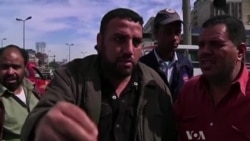CAIRO —
Egypt's economy continues its downward spiral, with political divisions and sporadic unrest hampering a change for the better. The government has come up with a package of reforms to help secure a much-needed loan from the International Monetary Fund.
Long lines of cars outside gas stations in Cairo signal the latest shortage to hit post-revolution Egypt: diesel fuel.
One driver says he has spent the past two days looking to fill up his car.
Whether it's a lack of basic commodities, or the inflated prices of those available, the daily challenges facing Egyptians have grown increasingly dire.
The larger picture is also bleak. Foreign reserves are dwindling, with some raising the specter of bankruptcy.
Economist Magdy Sobhy Youssef, of the Al Ahram Center in Cairo says if things carry on as they are now, they'll likely get worse in the coming months and Egypt might have to rely solely on foreign aid.
Since the old government was ousted in 2011, Egypt has been locked in a circle of a bad economy adding to political unrest, and political unrest adding to the bad economy.
Instability has kept foreign investors away, as well as tourists, a major revenue source. A travel agent near Tahrir Square is nervous about what comes next.
"We don't know how things are going to happen, or how it is going [to] be in the future for everyone. For me, as I am working in the tourism domain, this is really a big problem, I am suffering," he said.
His plight is echoed by many across the country who see economic hardships mounting.
Political activist and influential blogger Wael Khalil says the government must move quickly.
"An important element of the discontent is that many people are not finding jobs. Also things are not improving for them, are not having stable or secure jobs," said Khalil.
So far the government has been unable to provide a quick fix on the street level.
But this week officials said they had come up with a consensus plan to secure a key loan from the International Monetary Fund. Details, though, were slim, and there was no firm date set for further talks.
The IMF loan is seen as an important form of validation for Egypt, opening the way for other foreign loans and investments. But there is a catch. Meeting the terms of the loan will likely mean austerity measures, and that, based on past history, will likely lead to further street protests.
Economist Youssef worries the mainly Islamist government lacks any concrete plan.
He says they're dealing with the idea that "God's satisfaction will be enough to handle all problems." He adds that imagining a miracle will occur is not good politics.
And with Egypt edging toward the brink, analysts say it makes for bad economic policy as well.
Long lines of cars outside gas stations in Cairo signal the latest shortage to hit post-revolution Egypt: diesel fuel.
One driver says he has spent the past two days looking to fill up his car.
Whether it's a lack of basic commodities, or the inflated prices of those available, the daily challenges facing Egyptians have grown increasingly dire.
The larger picture is also bleak. Foreign reserves are dwindling, with some raising the specter of bankruptcy.
Economist Magdy Sobhy Youssef, of the Al Ahram Center in Cairo says if things carry on as they are now, they'll likely get worse in the coming months and Egypt might have to rely solely on foreign aid.
Since the old government was ousted in 2011, Egypt has been locked in a circle of a bad economy adding to political unrest, and political unrest adding to the bad economy.
Instability has kept foreign investors away, as well as tourists, a major revenue source. A travel agent near Tahrir Square is nervous about what comes next.
"We don't know how things are going to happen, or how it is going [to] be in the future for everyone. For me, as I am working in the tourism domain, this is really a big problem, I am suffering," he said.
His plight is echoed by many across the country who see economic hardships mounting.
Political activist and influential blogger Wael Khalil says the government must move quickly.
"An important element of the discontent is that many people are not finding jobs. Also things are not improving for them, are not having stable or secure jobs," said Khalil.
So far the government has been unable to provide a quick fix on the street level.
But this week officials said they had come up with a consensus plan to secure a key loan from the International Monetary Fund. Details, though, were slim, and there was no firm date set for further talks.
The IMF loan is seen as an important form of validation for Egypt, opening the way for other foreign loans and investments. But there is a catch. Meeting the terms of the loan will likely mean austerity measures, and that, based on past history, will likely lead to further street protests.
Economist Youssef worries the mainly Islamist government lacks any concrete plan.
He says they're dealing with the idea that "God's satisfaction will be enough to handle all problems." He adds that imagining a miracle will occur is not good politics.
And with Egypt edging toward the brink, analysts say it makes for bad economic policy as well.





